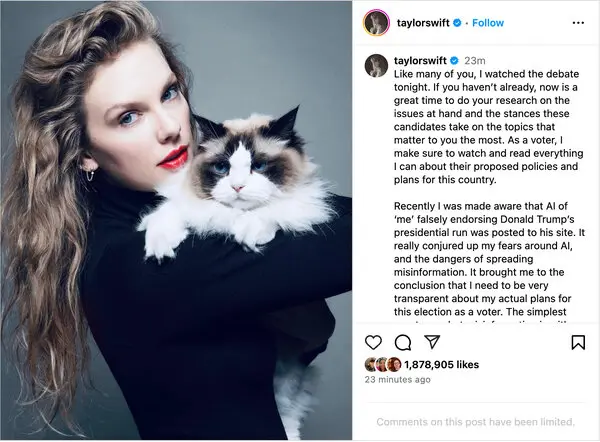Generation Z is getting a lot of attention this election cycle. More than 40 million eligible young people, ages 18-27, are eligible to vote in November. The 2022 midterm election brought historically high numbers of Gen Z voters to the polls, as young adults became more politically informed online. Today, the way in which celebrities and presidential candidates are engaging Gen Z is a reminder of how to reach this audience effectively.
Influencers and celebrities have spoken publicly through social media to support presidential candidates, further engaging the Gen Z audience to vote this election cycle. Minutes after the presidential debate last week, Taylor Swift endorsed Democratic presidential nominee Kamala Harris on Instagram. Her endorsement encouraged voters to do their own research for the November election, stating her fears about AI and misinformation. In August, an AI-generated photo of her endorsing Republican presidential nominee Donald Trump circulated. As AI becomes more engrained in everyday life, there’s concern of its threats to spread misinformation around political campaigns.
View this post on Instagram
Swift’s use of social media to reach her fans shows it’s an effective medium for rallying Gen Z. The announcement drove over 400,000 visitors to Vote.gov with voting resources, including information on registration, voting rights and security. According to data from the Office of the Secretary of the Commonwealth in Massachusetts, voter registration numbers increased from an average of 1,340 registrations each day in September to more than 11,000 two days after the presidential debate and Swift’s endorsement.
Other celebrities have used their social media to support Harris, including Olivia Rodrigo on an Instagram story, John Legend on his social media platforms, and Charli XCX, who posted the viral “kamala IS brat” on X.
The Harris campaign team has been using social media as a tactic to meet young people where they are. And what better way to resonate with young voters than with Gen Zers themselves. The campaign’s five-person Gen Z TikTok team is empowered to follow trends and pop culture.
The Republican party is also reaching out to Gen Z online. Influential people have used their platforms to support Trump, including Elon Musk on X, as well as former wrestler Hulk Hogan and country singer Kid Rock, who both made appearances at the Republican National Convention. Nonprofits have long used this tactic of obtaining celebrities and influential people to speak publicly in support of an initiative or the organization to encourage others to follow suit.
Logan Paul, YouTuber, wrestler and internet celebrity with more than 23 million subscribers, had the Republican presidential nominee as a guest on his “Impaulsive” podcast. In the interview, Trump encouraged Paul’s fans to vote for him over his opponent at the time, President Joe Biden. This was just one of Trump’s efforts to use podcasts to rally the (mostly male) Gen Z voters, having appeared on a few different podcasts over the last year. Young adults are more likely to listen to podcasts compared to older demographics, according to the Pew Research Center, which also found when people hear news on podcasts, they mostly view it as accurate and have a higher level of trust than other news sources.
The two 2024 presidential candidates are taking different approaches than in previous years, using social media and different media mediums to reach a younger audience over going to mainstream outlets like The New York Times. Major media networks have historically been the method to reach voters, but as media continues to morph and expand, campaigns that need the young vote are using the power of social media, podcasts, influencers, and celebrities leading up to the November election to urge Gen Z to get out and vote. From the examples of the 2024 campaign, nonprofits are learning that meeting young people where they are is an effective way to unite them for a cause.


